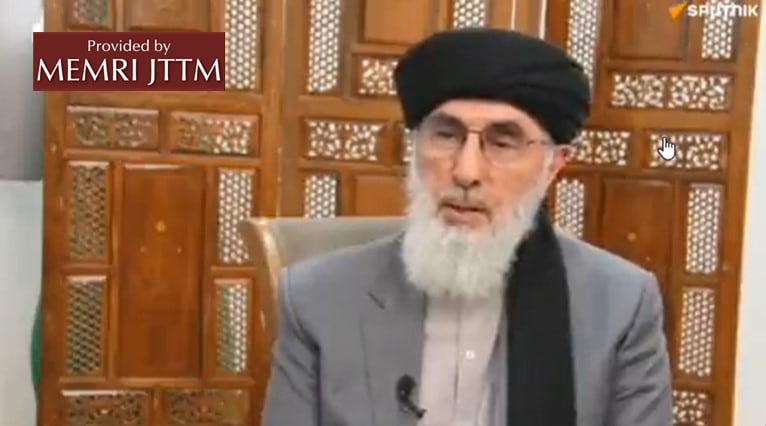The following report is now a complimentary offering from MEMRI's Jihad and Terrorism Threat Monitor (JTTM). For JTTM subscription information, click here.
Gulbuddin Hekmatyar, the former Afghan mujahideen leader who fought U.S. forces in Afghanistan after 9/11 before joining the peace process in Afghanistan, has said that his Hizb-i-Islami Afghanistan (HIA) party has no intention of joining the Afghan Taliban's de facto government.

In an interview with Russian news agency Sputnik, the HIA chief and former warlord said, "I personally and Hizb-i-Islami have no intention of joining the incumbent [Taliban] government. In the past too, our decision was that we will not join any unelected government." Hekmatyar added: "We have no way to solve a crisis without going to people for votes."
He said that if people want to end the fighting, they should turn to the nation for votes, continuing: "The people should make their own decision about the nature of the system [of government] in the light of their beliefs, values, and national interests. We insist on elections, do not want any job in the incumbent [Taliban] government nor in any unelected government," Hekmatyar stated.
Hekmatyar was a prominent mujahideen commander in the war against the Soviet Union in the 1980s and became the acting prime minister of Afghanistan in the mujahideen's interim government following the 1989 withdrawal of the Soviet forces. He engaged in factional fighting with the anti-Taliban Northern Alliance and was the first prime minister of a country to fire rockets on his own capital. He was called "the Butcher of Kabul." He went into hiding after the U.S.-led forces invaded Afghanistan in 2001 and was believed to be staying in Iran and Pakistan. Hekmatyar struck a peace treaty with the Ashraf Ghani government in Afghanistan in 2016 and moved to Kabul in 2017. He is currently in Kabul and has been occasionally issuing political statements aside from Friday sermons at his own mosque in the Afghan capital.
Source: Twitter.com, September 12, 2022
The full text of this post is available to subscribers.
Please login or register to request subscription information from MEMRI





